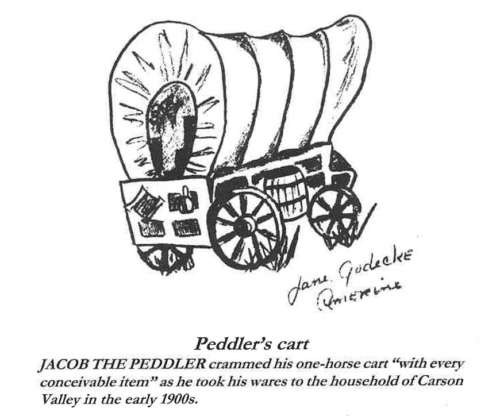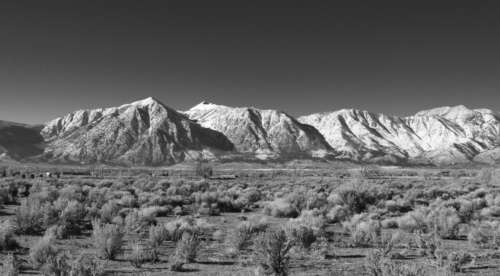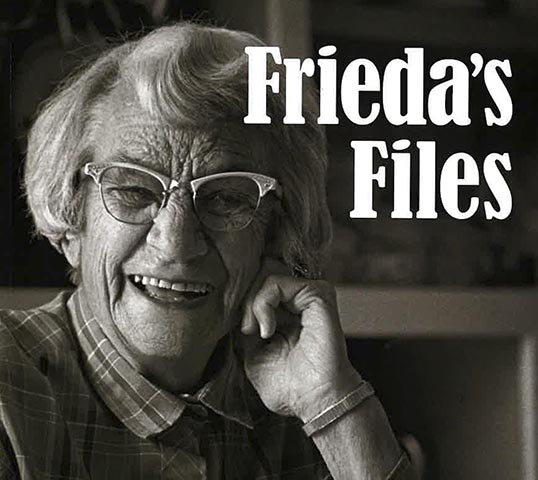Frieda’s Files are a collection of historical short stories about Carson Valley by Frieda Cordes Godecke, published in The Record-Courier. Reproduced here with permission from the Cordes Cousins, and their book “Frieda’s Files”.
June 30, 1977: Gingham and Calico Peddlers
There was a time during the early 1900s when Carson Valley housewives depended to a great extent on the periodic visits of the peddlers of the day for their household needs as well as much of the clothing for their families. True, there were Weinstock Lubin’s and Bellas Hess catalogues to resort to in case of necessity, but it was much more satisfactory to see and try on the merchandise one was interested in before making a big decision.
The first such peddler old-timers can recall was a little man known only as Jacob. No doubt he had a surname as people generally do, but, if so, no one was aware of it. Jacob he wanted to be and Jacob he was.

Jacob the peddler
This little peddler drove around the Valley with his one horse hitched to a cart loaded with every conceivable item it was possible to cram into it and on it. Boxes piled high on the seat next to him and on the floor boards of the cart, as well as pots and pans and other kitchen utensils dangling from various parts of the vehicle and from the horse, made Jacob’s visits most interesting indeed.
Then there was Isaac Goldstein who purchased his wares in Virginia City and peddled them in Carson Valley. If he did not have an article a customer desired or if the size wasn’t right, he brought what was needed on his next trip to the Valley.
Goldstein’s business proved to be so profitable that he purchased the abandoned creamery building at the crossroads in Waterloo and converted it into a general merchandise store. He and his family carried on a successful business there for quite some time.
One of the sons of Issac Goldstein, Louis, a graduate of the University of Nevada, was principal of the Gardnerville School for several years.
Probably the most popular peddler of the period was M. D. Menzinski who preferred to be called Mr. Menzin. His dry goods store on wheels very much resembled the prairie schooners that crossed the country during the gold rush days.
The two gaunt horses that took him to all parts of the Valley depended to a great extent on the generosity of the farmers for the daily rations. A lean, wire-haired dog sat on the seat beside him. When Menzinski found it necessary to be away from the wagon, he tied the dog to a long rope fastened to the back of the wagon. The dog was taught to stand guard until his master’s return.
Menzinski’s wares consisted mostly of wearing apparel for all members of the family and a selection of piece goods that might catch the eye of the lady of the house. After one visit to a home, he had the knack of knowing what was needed and preferred in that particular family and was sure to include it on his next visit.
He chose to bring his merchandise into the house for all to admire, to try on, and to gush over. Bold of gray gingham and calico, jackets, sweaters, shirts, trousers, boots, and shoes were spread about on furniture and rolled out on the floor. If there happened to be a baby in the family or one on the way, he was sure to include a bolt of soft flannelette in his display. Other items to entice the ladies were fancy buttons, ribbon, lace, and braids to be used on home-sewn garments.
Menzinski carried no yardstick or tape measure with him. He has his own technique in measuring anything sold by the yard. He claimed that the distance from the tip of his nose to the top of the forefinger on his outstretched arm was precisely a yard and preferred to use that method. This was disputed at times by his lady customers and after checking with a tape measure, it was often found that he fudged an inch or two here and there.
Although he specialized in dry goods, Menzinski also carried a line of salves, balms, and cure-alls. A sought-after product much in demand was the famous Alpen Kreuter – a sure remedy for almost anything that ailed you.

Jobs Peak Photo credit David Morris
Last, but not least of the peddlers, was a little lady by the name of Mrs. Rajah. She drove a sleek little black horse hitched to a buckboard. She catered mostly to the ladies of the Valley, offering the latest fashions in beautifully trimmed hats. Some were trimmed with ostrich plumes, others with lovely roses, ribbons, and net. It was so satisfactory to try on the hat you were interested in, before your own mirror, dressed in the costume with which you were planning to wear it.
Mrs. Rajah also carried a line of formfitting corsets, a must for the ladies of the day. You could feel free to try one on for size and, if necessary, there was always the convenience of adjusting the laces in the back to ensure a good fit.
When a lady attended church or a special social function around 1900, she ha the assurance of being well dressed if she wore one of Mrs. Rajah’s corsets and was crowned with one of her lovely hats.
Mrs. Rajah was the grandmother of Doug and Milt Sorensen of Gardnerville.
Looking back, the life of a peddler must indeed have had its trials. To be successful at his business, he found it necessary to be pleasant, witty, and persuasive, all rolled into one. He was forced at times to lower his price on certain articles by the lady of the house, for it was she who usually did the buying. Little did she realize that he was shrewd enough to add the ‘saved’ amount to another purchase she had made. He was forced to smile when five or six children with sticky fingers handled his wares and tried on his garments. Then, too, he must have been in constant fear of foul play as he carried not only a wagon load of merchandise with him, but a wallet filled with money as well.
Peddlers are a part of the past, but there are those of us who remember the thrill of their visits 70 or more years ago. What matter if brothers and sisters went to school clad in dresses and shirts cut from the same bolt of material, or if trousers were a bit baggy, shirt or coat sleeves too long or too short? It meant something to have taken part in the selection and to have been present when the peddler made his periodic visit to your house.



